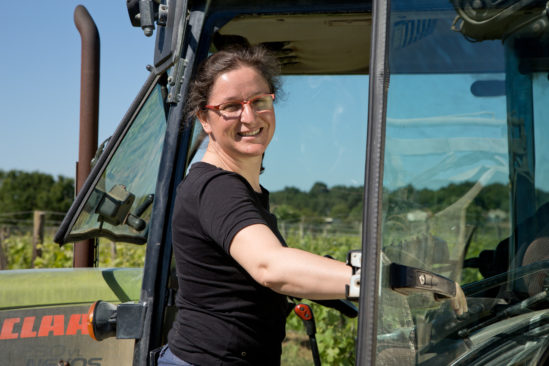SUSTAINABLE DEVELOPMENT SERIES
A new encounter in the Cognac region. Pascale Croc and Gary Charré greeted me in Bons Bois. Their estate? The Ferme de l’Orée, a 120-hectare organic farm which grows grapevines as well as chickpeas, split peas, lentils, hemp and sunflowers.
Farming and winegrowing
This is definitely the place: the Ferme de l’Orée, (which literally translates as “Farm on the outskirts”) is located on the edge of a small wood. We are in the village of Thézac, in the region of Bons Bois, one of the six “crus” or areas of the Cognac appellation where mixed farming is still very popular.
The estate is run by Pascale Croc and Gary Charré who produce pulses and virgin oil, alongside tending to 26 hectares of vines, all certified organic. In the vineyards, Pascale Croc – since she is in charge of the vines while Gary manages the other crops – is no stranger to Cognac. In fact, her grapes produce the wine spirits that are blended to make Hardy Organic VSOP Cognac – the emblematic cuvée of the Union de Coopérative de Viticulteurs Charentais (Cooperative Union of Charentes winegrowers, or Unicoop)!
The couple joined the cooperative thirty years ago and soon converted to agroecology. “We conducted our first mechanical weed control trials twenty years ago, which we then extended to all the vineyards. In 2008, we obtained certification for international environmental standard ISO 140001,” she highlights.
Biodiversity, microbial life: a snowball effect
It was only natural for him, then, to take over his family estate’s 22 hectares of vineyards in 2005 (it has now grown to around 50 hectares), firstly alongside his father before taking the reins in 2015. Just as naturally, he further developed the agro-environmental commitments undertaken by the former generation in the 1990s. “My father reduced the use of vine treatments. While the primary motivations for this were economic, the environmental benefits soon took precedence and I went one step further,” he acknowledges.
After several grassing trials in the 2000s onwards, he chose winter cover crops combining radishes and pulses (oats, fava beans, etc.). A pragmatic man with a farmer’s common sense, Guillaume sees the benefits of this practice every day. The roots loosen the soil and protect it from erosion. Surface cover crops enhance biodiversity in vine plots, providing shelter for animals while local birds naturally regulate insect populations in Charentes. Decomposed organic matter from shredded cover crops promotes the development of microbial life in the soil. “This 100% natural green fertiliser helps reduce the use of other input products,” Guillaume explains.
In the coming years, he also plans to abandon weedkillers entirely. “I started five years ago in the youngest vines: they are now herbicide-free,” he explains. Instead, Guillaume ploughs the soil underneath each vine row – a time-consuming, labour-intensive task which requires strong determination.
Biocontrol products made from trace elements, orange essential oils, or more traditionally, copper, are effective against mildew attacks. For example, in a year with a high risk of vine diseases, Guillaume uses biocontrol products in 70% of his treatments. “While more expensive than traditional products, biocontrol products are free from potentially dangerous chemicals, which makes them better for winegrowers, local residents and nature!”
In September 2020, Guillaume obtained HEV and Cognac Environmental Certification (CEC), which promotes initiatives that help preserve biodiversity, reduce the use of plant protection products, manage fertilizers and optimise the use of water resources. This achievement is also a great way to set an example, as Guillaume highlights: “Making Cognac certification mainstream among Cognac winegrowers will have a positive snowball effect in the region and elsewhere.”
To be continued…

Eurl Le Petit Bois
5 route de chez Barraud 17600 Thézac




